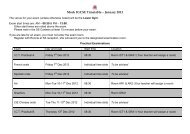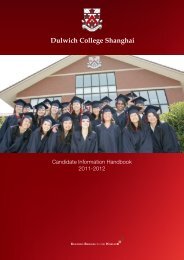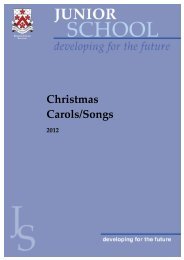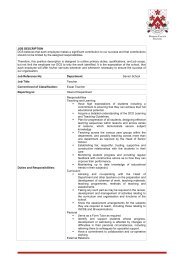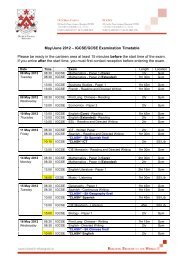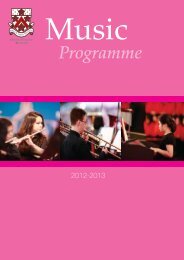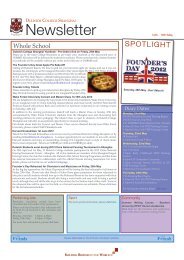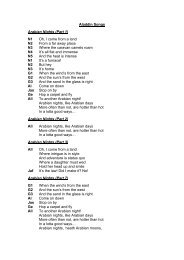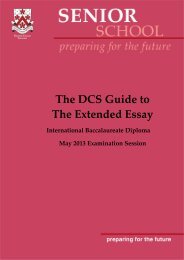preparing for the world - Dulwich College Shanghai
preparing for the world - Dulwich College Shanghai
preparing for the world - Dulwich College Shanghai
- No tags were found...
Create successful ePaper yourself
Turn your PDF publications into a flip-book with our unique Google optimized e-Paper software.
<strong>preparing</strong> <strong>for</strong> <strong>the</strong> <strong>world</strong>Full details of <strong>the</strong> IBO procedures regarding suspected malpractice can be found in <strong>the</strong> 2009 IBO Guide to AcademicHonesty.The consequences of academic dishonesty may include:• A change of grade on an official document.• A parent conference• The student being placed on an internal suspensionFirst Instance:• The student will receive a 0 on <strong>the</strong> assignment or test.• The teacher will confer with <strong>the</strong> student• A report will be placed in <strong>the</strong> student’s permanent file• The student will be spoken to by a senior member of staff• The student’s parents will be notified of <strong>the</strong> malpracticeFur<strong>the</strong>r repeated offences may result in suspension and ultimately expulsion from <strong>the</strong> <strong>College</strong>.CounsellingThe <strong>College</strong> offers two types of counselling service open to all members of <strong>the</strong> community.The Director of Student Welfare is available to students, parents and staff during <strong>the</strong> school day to provide support andadvice as needed. The Director will also be engaged in proactive education programmes through PSHCE and ParentForums that seek to provide members of <strong>the</strong> community with appropriate alternatives be<strong>for</strong>e <strong>the</strong>y become issues.The Careers and University Guidance Counsellors are also available to students, staff and parents who are looking <strong>for</strong>in<strong>for</strong>mation regarding all matters relating to fur<strong>the</strong>r education. The Careers and University Guidance Counsellors willalso contribute to appropriate educational sessions throughout <strong>the</strong> year as well as <strong>for</strong>ming an intricate part of <strong>the</strong> PSHCEprogramme in Year 10 to Year 13.Student Welfare and Pastoral CareStudent welfare and pastoral care encompasses a variety of elements that work toge<strong>the</strong>r to ensure that daily life at <strong>the</strong><strong>College</strong> runs smoothly. S chool life is not only about academics, but also it is valuable preparation time <strong>for</strong> <strong>the</strong> <strong>world</strong>outside our walls. Student welfare takes into account <strong>the</strong> social, emotional, psychological and physical well being of <strong>the</strong>student members of our community.Behaviour ManagementWe recognise that effective teaching and learning will only take place in an atmosphere where <strong>the</strong>re is a clear understandingof what is and what is not acceptable behaviour. All members of <strong>the</strong> school community must play <strong>the</strong>ir part in ensuringthat <strong>the</strong> rules and practices governing good behaviour set out below are adhered to.We believe that:• Good behaviour should be taught and rewarded• Behavioural problems should be minimised or, better still, do not occur in <strong>the</strong> first place• Where problems do occur, measures are in place to support students and to reduce <strong>the</strong>ir impact upon <strong>the</strong> schoolcommunity and <strong>the</strong> smooth running of <strong>the</strong> schoolWe aim to:• Support students in maximizing <strong>the</strong>ir potential• Relate behavioural issues directly to <strong>the</strong> Students’ Duties and Responsibilities• Develop a framework, which defines agreed roles and responsibilities and promotes consistency in carryingout designated tasks• Respond swiftly to inappropriate behaviour• Provide support, advice and guidance to students and parents• Develop a systematic approach to ga<strong>the</strong>ring and analyzing data related to behaviour• Identify students who are at risk of not fulfilling course requirements due to poor behaviour• Develop positive and consistent communication between home and school• View behavioural misdemeanours as learning opportunities• Provide a solid, consistent framework, which guides <strong>the</strong> actions of our teaching staffDCS Student Expectations• Be interactive and proactive: learning is a two way process involving both teachers and students• Be positive and enthusiastic about your work and studies• Be prepared <strong>for</strong> class; ensure that you have all <strong>the</strong> necessary books and equipment• Enter <strong>the</strong> classroom quietly when you arrive and prepare yourself <strong>for</strong> <strong>the</strong> lesson to begin• Do not enter areas prohibited to students without a teacher present• Be punctual• Make up missed work quickly after an absence; it is your duty to seek out <strong>the</strong> teacher or a classmate and copyup all missed work• Meet all internal subject deadlines and plan ahead• Act on feedback from your teacher• Review your work on a regular basis, rereading your notes and clarify any aspects of your work you do notunderstand• Take <strong>the</strong> initiative, ask questions and solve problems• Be polite and respectful to your peers, staff and members of <strong>the</strong> wider community• Engage and participate in all aspects of <strong>College</strong> life• Respect and safeguard <strong>the</strong> property of <strong>the</strong> <strong>College</strong>, your peers and <strong>the</strong> surrounding environment• Be proactive when witnessing behaviour that goes against our <strong>College</strong> expectations• Do not bring any dangerous, illegal or offensive items or materials to school31 32



